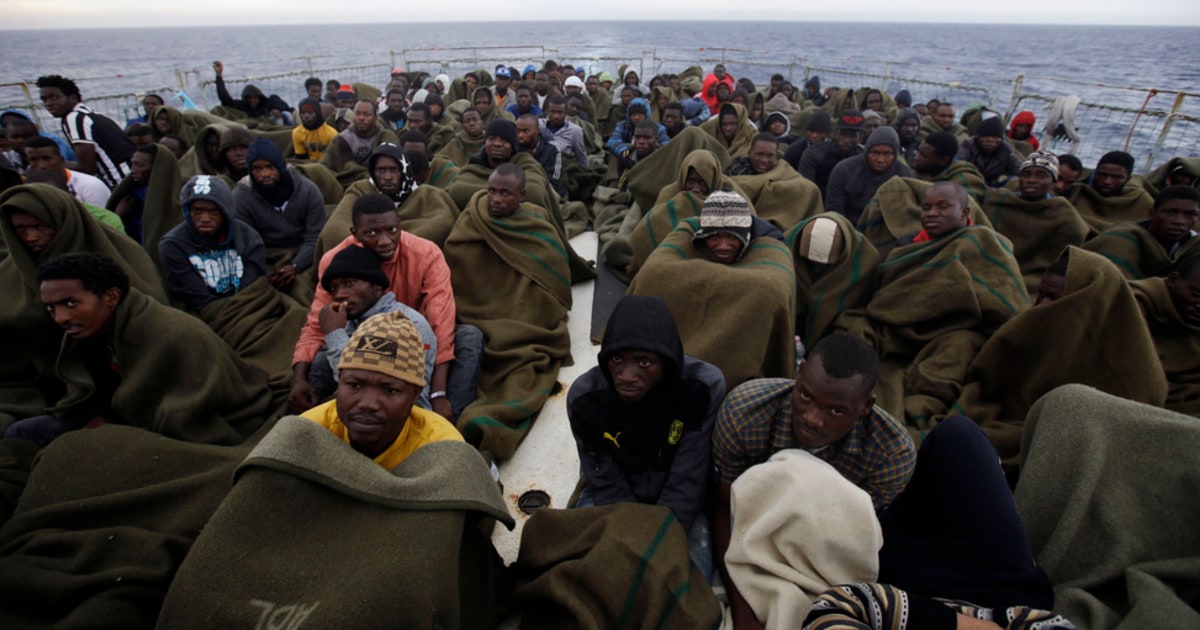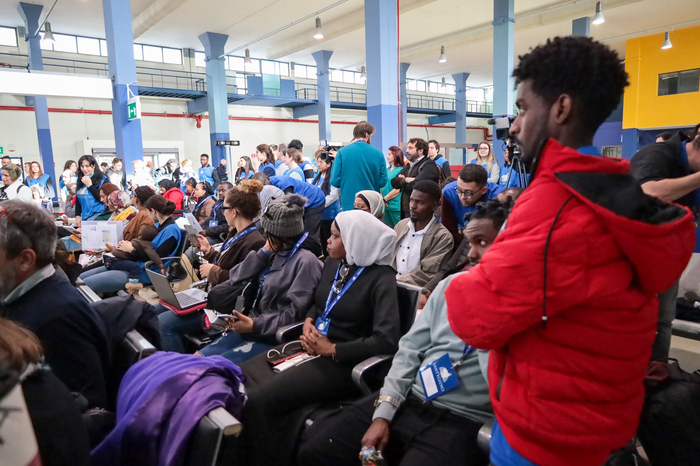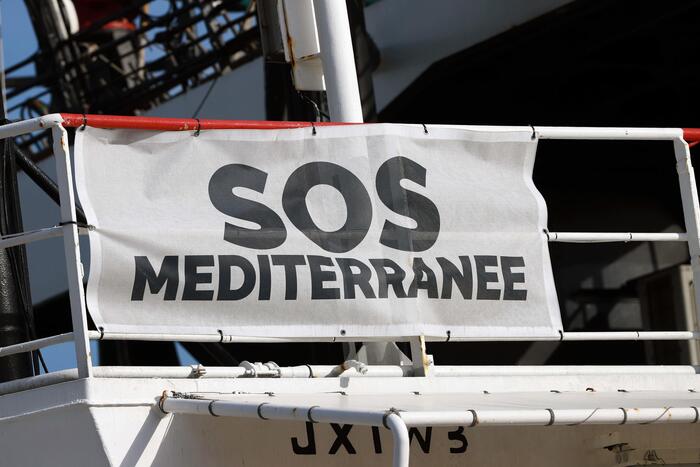Global society
all articles
When migrants flee from Libyan torture prisons to Europe, most realize one thing: they need to get far out into the Mediterranean, out of the Libyan Search and Rescue Zone (SAR), which stretches many miles into the sea. If the Libyan Coast Guard finds them, they are brought back to the civil war country they wanted to escape.
On the other hand, if the fugitives continue to make it into the Maltese SAR zone, the Maltese Rescue Coordination Center is in charge, and they can not send anyone back to the Civil War. The migrants usually come to Europe, at least if they are saved.
The refugee organization Alarmphone but makes the Maltese authorities now serious allegations. According to the activists, on October 18, the Maltese Rescue Center deliberately delayed the rescue of a boat and had 50 migrants taken back to Libya by a patrol boat from the Libyan Coast Guard - even though the refugee boat was well within the Maltese SAR zone.
BREAKING: so-called Libyan coastguard intercepts boat from Maltese #SAR!
At 21:32 CEST we talked to the coordinating authority, RCC #Malta, who told us that the LYCG had intercepted the boat from Maltese SAR at 34 ° 47'N, 012 ° 37'E - a clear violation of international law! pic.twitter.com/Agh0S6vIOE
If the allegations prove true, that would be a new low point for the already brutal European migration policy in the central Mediterranean. The EU has long been under criticism for training and financially supporting the Libyan Coast Guard to bring refugees back to Libya. In detention centers, they are often tortured, blackmailed, raped or killed.
New dimension of European deterrence policy ?
The fact that the repatriation to Libya now apparently happened with the direct assistance of Europeans within European SAR zones would be a new dimension. Omer Shatz, a lecturer at the Paris School of Science Po, and Alexander Proelß, a professor at the University of Hamburg, interviewed by SPIEGEL experts on international and maritime law, see a clear breach of law in such a procedure. The Maltese Ministry of the Interior did not respond to a SPIEGEL inquiry on the allegations until Wednesday afternoon.
The Special Representative for the Central Mediterranean of the UN refugee network UNHCR expressed his "concern" on Twitter. This is "not the first time," wrote Vincent Cochetel. On Tuesday, the UNCHR also announced it would investigate the reasons for the repatriation. So it reports the news agency AP. The repatriation to Libya was a violation of the law of the sea, said Cochetel.
I am sharing your concern. Https://t.co/IORfhlmpTc
- vincent cochetel (@cochetel) October 20, 2019There have been such allegations in the past, he said. So far, in his view, there is no evidence that repatriations from European rescue zones would become common practice.
"We will take care of everything"
The allegations of Alarmphone are well documented. The recording of a telephone call to the rescue center in Malta, which is in the SPIEGEL, supports the version of the activists. The Alarmphone consists of a group of volunteers who receive calls for help from migrants in distress or from their relatives and forward them to the competent authorities.
According to the organization, an alarmist activist first alerted the Maltese Rescue Team at 2:40 pm on October 18, stating that a boat carrying 50 people on board, including ten women and five children, had been in distress within the Maltese SAR zone.
"We'll take care of everything," an officer on duty promised the activist according to the Alarmphone Protocol. Afterwards the activists kept the contact to the migrants on the boat according to own data, received again and again updated GPS coordinates. These had passed the activists to the Maltese Rescue Center, but they did not answer.
At 7 pm, the migrants reported that water was getting into the boat. Only at 9.30 pm, just under seven hours after the first alarm, the activists had contact with the rescue center again.
In the telephone conversation, the on-duty official admitted that the migrants had been picked up by a patrol boat belonging to the Libyan Coast Guard, PV Fezzan. (Our reporters were aboard this boat in July, read a report here.)
This is how it sounds on the recording. "Sir, I have confirmation that this case has been rescued by the Libyan Coast Guard, named PV, platform vessel, Fezzan." The Libyans had already accepted the case outside the Maltese rescue zone. The officer on duty also mentions the boat's last GPS coordinates: "34 ° 47N 012 ° 37E".
The coordinates are well within the Maltese SAR zone. While Malta does not necessarily have to save herself, she is responsible for coordinating the rescue. Obviously, the migrants were deposed by the Libyan Coast Guard in Tripoli and taken from there to a refugee prison.
So it is on a Twitter account to read, which often documents the actions of the Libyan Coast Guard. Activists recognized the boat on the Twitter photo. A relative also recognized his brother in the Twitter video and informed the alarm phone.
1 / 2 # SAR Op 18.10.19 - Libyan Coast Guard ship "Fezzan" rescued in 3 sep. Ops 148 #migrants incl. 15 women & 11 children. All disembarked on 19.10.19 @ Tripoli NB 08:10 hrs. Upom MedA & HuA transferred to Triq Al Sekka for processing. #Migrantcrisis #Frontex #TogetherForRescue pic.twitter.com/h4Co058DXs
- Migrant Rescue Watch (@rgowans) October 19, 2019"We have never experienced anything like this"
Maurice Stierl is one of Alarmphone's activists. He blames the Maltese authorities. "We've never experienced anything like this before, and the case marks a new dimension in European isolationism," he says. "Europe not only drowns people from Libya, but also kidnaps them from their own rescue zones and brings them back to a warland where they experience inhumane abominations."
More at SPIEGEL +
This case clearly proves that 50 fleeing people were captured inside an EU rescue zone and taken back to a Libyan torture camp. The Maltese Rescue Coordination Center delayed the rescue in a distress and risked the lives of 50 people. He considers this as a violation of the Convention on the Rights of the Sea as well as the Human Rights and Refugee Convention.
"Legally unacceptable"
Even independent legal experts consider the procedure described by Alarmphone to be extremely problematic for the Maltese Rescue Coordination Center. According to Alexander Proelß, Professor at the Department of International Maritime Law and Environmental Law, International Law and Public Law at the University of Hamburg, it is against the spirit and purpose of the International Convention on Sea Rescue. The Convention always requires those measures which can most effectively and quickly end the distress situation.
The Maltese approach is also problematic against the background of the European Convention on Human Rights, says Proelß. According to the convention, EU countries are prohibited from bringing people back to Libya because they are not receiving decent treatment there.
"The rescue center in Malta apparently knew about the distress, it was waiting to start a behavior that Malta itself would not be allowed to do," says Proelß. "In this respect, the omission of Malta, the provisions of the Convention on Human Rights were undermined." In my opinion, this is unlawful and legally unacceptable. " However, this position is controversial among lawyers, partly because Libya has not signed the Convention on Human Rights.
However, Omer Shatz, lecturer at Yale Law School and the Paris elite high school Science Po, sees Malta's actions as a clear violation of human rights.
The involved actors would have also made themselves punishable on an individual level. "The refusal of the rescuers by the officials is attempted manslaughter," he says. "The officials also commit crimes against humanity by ordering an EU-funded militia to forcibly return 50 survivors to the detention centers from which they have fled, thus being involved in persecution, deportation, detention, rape, torture and enslavement the statutes of the International Criminal Court. "
Shatz had last reported with other lawyers responsible of the European Union and its member states at the International Criminal Court in The Hague.
Are there more cases of illegal repatriation?
The question is whether the alleged repatriation from a European rescue zone to Libya was a one-off event or a new part of European foreclosure policy.
The civilian sea rescue organization Sea-Watch has the suspicion that behind such repatriations could be a method. "We assume that Maltese authorities have at least since June from their search and rescue zone pushbacks to North Africa," said spokesman Ruben Neugebauer. "With our reconnaissance aircraft, we were able to document events that allow no other conclusion."
Neugebauer says he saw a Libyan patrol boat in June, flying north at full speed just a few miles south of the border of the Libyan SAR zone. Exactly on the course, a few miles inside the Maltese SAR Zone, there was a rubber dinghy that also went north, above it an Italian Air Force plane. The Italian coast guard, according to Neugebauer, only rescued after asking her over the radio and emphasizing that she was filming the situation.
"We have to assume that a pushback should be carried out here," says Neugebauer, even if he can not take the final proof. Similar situations have since been repeatedly observed.
This article is part of the project Global Society, for which our reporters report from four continents. The project is long-term and supported by the Bill & Melinda Gates Foundation.
What is the project Global Society?
Under the title Global Society, reporters from Asia, Africa, Latin America and Europe will be reporting on injustices in a globalized world, socio-political challenges and sustainable development. The reportages, analyzes, photo galleries, videos and podcasts appear in the Politics Department of SPIEGEL. The project is long-term and will be supported over three years by the Bill & Melinda Gates Foundation (BMGF).
Are the journalistic contents independent of the foundation?
Yes. The editorial content is created without the influence of the Gates Foundation.
Do other media have similar projects?
Yes. Major European media such as "The Guardian" and "El País" have created similar sections on their news pages with "Global Development" or "Planeta Futuro" with the support of the Gates Foundation.
Was there already similar projects at SPIEGEL ONLINE?
SPIEGEL ONLINE has already implemented two projects in recent years with the European Journalism Center (EJC) and the support of the Bill & Melinda Gates Foundation: The "Expedition The Day After tomorrow" on Global Sustainability Goals and the journalistic refugee project "The New Arrivals" Several award-winning multimedia reports on the topics of migration and escape have emerged.
Where can I find all the publications on the Global Society?
The pieces can be found at SPIEGEL ONLINE on the topic page Global Society.









